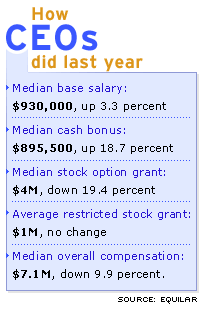NEW YORK (CNN/Money) -
The CEO of PeopleSoft, Craig Conway, received compensation worth $112 million last year, according to an analysis showing that Conway stands to make more money than any other head of a Standard & Poor's 500 company.
The analysis from Equilar, a compensation research firm, found that Conway's $1 million salary and $1.9 million bonus came close to the medium CEO salary and bonus of $1.8 million. But the value of Conway's stock options -- $94.5 million -- plus $14.6 million in restricted stock pushed him to the top among the 473 proxies from S&P 500 companies studied by Equilar.
PeopleSoft, a software maker, did not return a call requesting comment.

Last year was a good year for most CEOs even though employers cut hundreds of thousands of jobs and the stock market suffered a third straight annual decline.
Equilar found that the median base salary for CEOs rose 3.3 percent to $930,000. The median bonus climbed 18.7 percent to $895,500. But because of the declining value of stock option grants, overall compensation fell 9.9 percent to $7.1 million.
Steve Jobs, the CEO of Apple Computer, was No. 2 behind Conway, according to the Equilar analysis. Jobs got a compensation package worth $76.8 million comprised of a $1 salary, a $2.3 million bonus and $74.5 million in restricted stock. Jobs received no options to buy shares of Apple, which fell 34 percent last year.
Apple, which did not make significant job cuts last year, declined to comment on Jobs' pay package.
Option grants padded the $65.9 million compensation package of MBNA's CEO, Charles Cawley, who was third on the list. His package consisted of $3 million in both salary and bonus, $20 million in restricted stock, and options valued at $39.9 million. Shares of MBNA (KRB: Research, Estimates), a banking company, fell 17 percent last year. The company did not returned a call requesting comment.
The options debate
Critics say stock options, which allow shares to be bought at below-market prices, provide incentive to inflate profits. Restricted stock, some say, better aligns management with shareholders because, unlike exercised stock options, restricted stock can not be immediately sold.
But Leigh Riley, who advises companies on compensation at the Chicago law firm Foley & Lardner, said executive compensation packages are being unfairly linked to the accounting scandals that bankrupt companies like Enron and WorldCom.
"Stock options and others performance based compensation still work," said Riley.
PeopleSoft's Conway may have some work ahead of him. The biggest part of his grant permits him to buy 3 million shares at $29.29. In order for him to cash in, those shares, which traded at around $16 Friday, would need to rise 82 percent before the deal expires in 2012. Shares of PeopleSoft (PSFT: Research, Estimates) fell 52 percent last year.
Moving away from options
Equilar's figures found a slight shift away from granting options. The percentage of CEOs receiving option grants in 2002 stood at 84.9 percent from 87.9 percent the prior year. The median option grant size slipped to 261,032 options from 285,569 in 2001.
| Related Stories
|

|
|
|
|
At least one company, insurer Progressive Corp. (PGR: up $0.15 to $70.15, Research, Estimates), scrapped option awards for restricted stock. But shareholders at Wells Fargo (WFC: Research, Estimates) last month voted down a plan to ban stock option grants at the nation's No. 4 bank.
Options are alive and well at Tyco International (TYC: Research, Estimates). The conglomerate's CEO, Edward Breen, received 7.35 million options last year, more than anyone in Equilar's study.
In its study, Equilar looked at S&P 500 companies with fiscal years ending between Feb. 28, 2002 and Jan. 31, 2002. Two of the companies, Fannie and Freddie Mac, don't file proxies. The remainder of the excluded S&P 500 companies are retailers who hadn't filed proxies in time.
Equilar values option grants using the Black-Scholes method, a complicated formula that makes assumptions based on the term of the option, the volatility of the stock, the stock's price and its dividend yield.
Belt tightening
Not all CEOs did well. Lawrence Ellison, of Oracle Corp (ORCL: Research, Estimates)., A. Jerrold Perenchio, of Univision Communications (UVN: Research, Estimates), Richard D. Fairbank of Capital One Financial (COF: Research, Estimates), and Frank V. Atlee, of Monsanto Corp. (MON: Research, Estimates), all received no compensation last year.
Others took big hits. After enjoying a package worth $269 million in 2001, Thomas Siebel, the CEO of Siebel Systems (SEBL: Research, Estimates), brought home $1 last year, when the stock fell 70 percent.
As for bonuses, it was good to be Sumner Redstone. The CEO of Viacom (VIA: Research, Estimates) got a $16.5 million bonus last year, when the stock's 7 percent decline outperformed the market. James Cayne, the CEO of Bear Stearns (BSC: Research, Estimates), had the second-largest bonus: $10 million. That was followed by Henry Silverman of Cendant (CD: Research, Estimates), who took home $7.8 million in bonus compensation.

|

